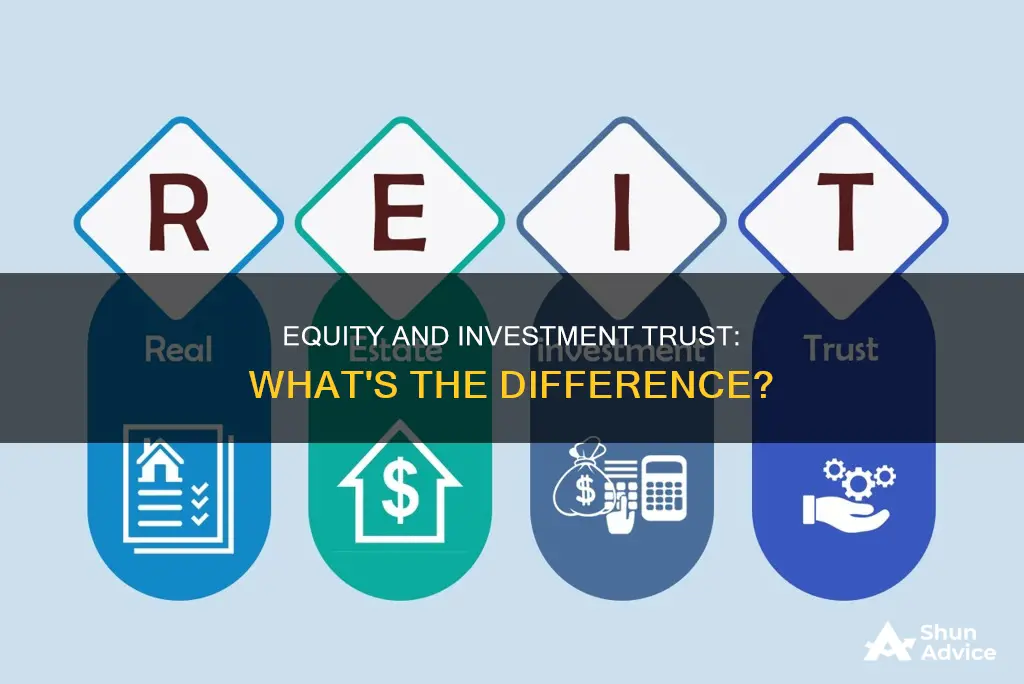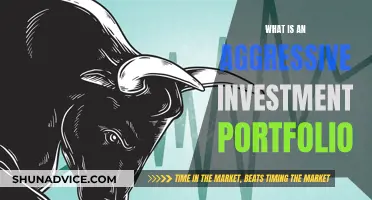
Investment trusts are a form of investment fund that pool investors' money to buy a portfolio of investments, including equities, commodities, fixed-income securities, or real estate. They are constituted as public limited companies and are therefore closed-ended, with a fixed number of shares that do not change. This allows fund managers to focus on long-term investment strategies without the pressure of short-term redemption. Investment trusts are managed by an expert team that decides when to buy and sell investments, and they are monitored by an independent board of directors elected by shareholders. Equity unit investment trusts (EUITs) are a specific type of investment trust that only invests in the stocks of publicly traded corporations.
| Characteristics | Values |
|---|---|
| Type of fund | Investment trusts are closed-end funds |
| Number of shares | Investment trusts issue a fixed number of shares at inception |
| Buying and selling | Investment trusts can be bought and sold like stocks |
| Management | Investment trusts are actively managed |
| Borrowing | Investment trusts are able to borrow money |
| Liquidity | Investment trusts typically have lower liquidity |
| Trading costs | Investment trusts may have higher trading costs |
| Tax efficiency | Investment trusts may be less tax-efficient |
| Dividends | Investment trusts have potentially higher dividend yields |
What You'll Learn
- Investment trusts can hold a variety of assets, including listed equities, government/corporate bonds, real estate, and private companies
- Investment trusts are run as public limited companies and are known as closed-ended funds
- Equity funds are often categorised by investment style, portfolio focus, and level of diversification
- Actively managed equity funds have portfolio managers who research, analyse and select stocks with the goal of outperforming a benchmark index
- Passively managed equity funds include index funds, which aim to replicate the performance of a specific market index

Investment trusts can hold a variety of assets, including listed equities, government/corporate bonds, real estate, and private companies
Investment trusts are a form of investment fund that are constituted as public limited companies. They are closed-ended funds, meaning that fund managers cannot redeem or create shares. The shares are traded on stock exchanges, and the fund's value is determined by the underlying value of the share portfolio. Investment trusts can borrow money to buy shares or other assets, which is known as 'gearing'.
Investment trusts can hold a wide variety of assets, including listed equities, government/corporate bonds, real estate, and private companies. These assets may be listed, incorporated, or domiciled in any region. The specific assets held by an investment trust will depend on its investment objectives and risk profile.
For example, an investment trust focused on growth may invest in a range of equities to benefit from rising stock markets, while an income-focused trust may invest in government bonds to generate consistent dividend payouts. A trust with a higher risk tolerance may invest in private companies, while one with a lower risk tolerance may focus on more stable assets such as real estate.
The flexibility to hold a diverse range of assets is one of the key advantages of investment trusts. This allows investors to access a variety of investments that may be too complicated or costly to manage as individual holdings.
Investment Management: What You Need to Study and Know
You may want to see also

Investment trusts are run as public limited companies and are known as closed-ended funds
Investment trusts are a form of collective investment scheme, often referred to as closed-ended investment funds. They are structured as public limited companies (PLCs), which means they are legally separate entities from their shareholders and are owned by their shareholders. This structure is different from that of open-ended mutual funds, which are not separate legal entities and are instead owned by their investors directly.
One of the key characteristics of investment trusts is that they issue a fixed number of shares, which are then listed and traded on a stock exchange. This is in contrast to open-ended funds, which continuously create and redeem shares based on investor demand. As a result, the share price of an investment trust is determined by market demand and can trade at a discount or premium to the net asset value (NAV) of the underlying investments.
Being a PLC, an investment trust is required to have a board of directors who are responsible for the overall management and governance of the company. The board's duties include appointing a fund manager to oversee the day-to-day investment decisions and ensuring the trust adheres to relevant regulations and acts in the best interests of its shareholders.
Shareholders of an investment trust have certain rights, including voting on important matters such as changes to the trust's investment policy, the appointment of directors, and the approval of financial statements. They also have the right to receive dividends if and when they are declared by the board.
One advantage of the closed-ended nature of investment trusts is that the fund manager has a fixed pool of capital to invest and is not subject to continuous inflows and outflows of investor money. This can provide more stability and allow the manager to take a longer-term approach to investing. Additionally, investment trusts can gear their capital by borrowing money to invest, which can enhance returns but also increases risk.
In summary, investment trusts, as closed-ended funds run as PLCs, offer a unique set of features that set them apart from other types of investment funds. Their structure provides a combination of professional management, shareholder governance, and the potential for stable, long-term investment strategies. However, as with any investment, it is important to carefully consider the risks and potential rewards before investing in an investment trust.
Recording Equity Investments: A Comprehensive Guide
You may want to see also

Equity funds are often categorised by investment style, portfolio focus, and level of diversification
Investment Style
Equity funds are typically classified as either growth or value funds. Growth funds focus on companies with strong growth potential, such as those in emerging markets or innovative industries. On the other hand, value funds invest in companies that appear undervalued or established companies with stable financials.
Portfolio Focus
Equity funds can also be categorised by their portfolio focus, which refers to the types of companies they invest in. For example, some funds may focus on large-cap companies, while others may target small-cap or mid-cap firms. Additionally, funds can be classified based on their industry focus, such as technology, healthcare, or consumer goods.
Level of Diversification
The level of diversification pertains to the range of assets and industries an equity fund invests in. Well-diversified funds spread their investments across various sectors and markets to minimise risk. However, some funds may choose to focus on a specific region or industry, sacrificing diversification for higher potential returns.
Other Factors
Other factors that categorise equity funds include their investment strategy, such as active or passive management, and their cost structure, including management fees and transaction expenses. Additionally, funds may be classified based on their performance, with some focusing on capital appreciation, while others emphasise dividend income.
In summary, equity funds are classified according to their investment style, portfolio focus, and level of diversification, among other factors. These classifications help investors understand the fund's strategy, risk profile, and potential returns, enabling them to make informed investment decisions.
Understanding the Makeup of a Modern Investment Portfolio
You may want to see also

Actively managed equity funds have portfolio managers who research, analyse and select stocks with the goal of outperforming a benchmark index
Actively managed equity funds are a type of investment fund that pools money from investors to primarily trade a portfolio of stocks, also known as equity securities. These funds have portfolio managers who actively research, analyse and select stocks with the goal of outperforming a benchmark index, such as the S&P 500. The portfolio managers use their expertise and various strategies to decide whether to buy, hold or sell stocks within the fund's portfolio. The success of an actively managed fund largely depends on the fund manager's skill and decision-making ability.
Actively managed equity funds offer investors a professionally managed, diversified approach to investing in stocks, with the potential for attractive long-term returns. While investing in stocks carries more risk than some other investments, a fund can diversify with stocks from many different companies, thus offering some protection from the risk of one or more of the stocks underperforming. Their growth potential attracts investors with longer time horizons who can weather short-term market changes with the patience to see higher returns over the long run.
Actively managed equity funds are often categorized based on the size of the companies they invest in. Large-cap funds invest in stocks of large companies, typically those with a market capitalization exceeding $10 billion. These companies are usually well-established and mature, with stable growth and consistent dividends. Midcap funds invest in companies with market capitalizations between large and small-caps, which are often in a growth phase with potential for rapid expansion. Small-cap funds buy stocks of smaller companies, typically with a market capitalization under $2 billion. These companies are often younger and less established but offer the potential for high growth.
Actively managed equity funds also vary in their investment strategies, with two main categories being growth funds and value funds. Growth funds invest in stocks of companies expected to have rapid earnings growth, while value funds buy stocks that are considered undervalued based on fundamental analysis. Blend equity funds invest in a mix of both growth and value stocks, providing a balance between the two strategies.
The choice between actively managed equity funds and passively managed funds depends on your goals, risk tolerance and investment philosophy. Actively managed funds offer the potential for outperformance but typically charge higher fees. In contrast, passively managed funds, such as index funds, aim to replicate the performance of a market index and generally have lower fees and taxes.
Investing for Retirement at 30: A Guide for Indians
You may want to see also

Passively managed equity funds include index funds, which aim to replicate the performance of a specific market index
An investment trust is a form of investment fund that is constituted as a public limited company. Investment trusts are mostly found in the United Kingdom and Japan. They are run by an elected board of directors who monitor the performance of the company and look after shareholder interests. The board also chooses a professional portfolio manager to manage the company's investments.
Passively managed equity funds are a style of management associated with mutual and exchange-traded funds (ETFs). They are called "passively managed" because they do not require active hunting for investments. Instead, they aim to replicate the performance of a specific market index. This is done by purchasing the securities in a representative benchmark, such as the S&P 500, and holding them for a long time.
Index funds are a common type of passively managed fund. These funds are designed to keep pace with market returns by trying to mirror certain market segments. They do this by buying all or a representative sample of the stocks or bonds in the index they are tracking. For example, the Vanguard 500 Index Fund Admiral Shares is an index fund that aims to replicate the performance of the S&P 500.
Passively managed funds tend to charge lower fees than actively managed funds because they do not require costly research. They also benefit from reduced fees associated with frequent trading. In addition, the efficient market hypothesis (EMH) demonstrates that no active manager can beat the market for long, as their success is only a matter of chance. Therefore, passive management can deliver better returns over the long term.
However, one disadvantage of passively managed funds is their lack of flexibility. Fund managers are usually prohibited from using defensive measures, such as reducing their position in shares of particular securities, even if they think those share prices will decline. Additionally, passively managed funds are designed to closely track their benchmark index, rather than outperform it. As a result, they rarely beat the return on the index and usually return slightly less due to operating costs.
QuickBooks Equity Investment: A Simple Guide to Adding Yours
You may want to see also
Frequently asked questions
The fees for self-directed IRAs depend on the custodian. Equity Trust offers a straightforward fee schedule that’s based on the balance of your account.
The Internal Revenue Code sets high standards for qualified custodians of IRA accounts, which include banks, trust companies, and approved brokerage firms. Equity Trust Company and its affiliates have operated as a qualified IRA custodian since 1983.
Equity Trust holds a variety of IRAs, as well as other self-directed accounts, including Health Savings Accounts (HSA) and Coverdell Education Savings Accounts (CESA).
Yes, once your account has been opened and you have your Client Access PIN, you can check your account status online 24/7 via myEQUITY on your computer, tablet, or mobile device.
Yes, a self-directed IRA allows you to diversify your portfolio with additional investments permitted by the IRS, in a tax-free or tax-deferred environment.







